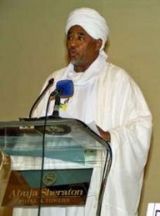Darfur peace talks hit early snag over Eritrea role
By Camillus Eboh
ABUJA, June 11 (Reuters) – A new round of peace talks on Sudan’s Darfur region ran into early problems on Saturday as Khartoum’s negotiators rejected Eritrean participation, stopping the first behind-closed-doors plenary session from going ahead.

|
|
Sudan’s Minister of Agriculture and chief negotiator, Majzoub al-Khalifa, addresses the fifth round of Darfur peace talks in Abuja, Nigeria, June 10, 2005. (Reuters). |
The talks between delegates from the Sudanese government and from two Darfur rebel movements resumed on Friday in the Nigerian capital with all parties expressing hope they would clinch a deal to end more than two years of bloodshed in Darfur.
A team from the African Union (AU) is mediating, backed by international observers such as the United Nations, the European Union and several countries. Eritrea is one of a group of African countries due to attend.
“We cannot accept Eritrea as an observer or facilitator … It is known that they have been arming the rebels so they cannot be an observer,” said Majzoub al-Khalifa, head of the Sudanese government’s negotiating team.
“We are not saying that the talks should be postponed or cancelled because Eritrea is in Abuja. In fact, the aim of Eritrea itself is to create problems and we are not going to give them the chance to be an obstacle,” he added.
Sudan has often accused Eritrea of supporting the rebels in Darfur, who opened offices in the capital Asmara last year. Eritrea denies the accusation.
AU mediators spent the whole day in separate meetings with the parties to try and resolve the issue, but despite their efforts the planned plenary session was put off indefinitely and the rebels slammed the government’s position.
“We may not continue with the talks if Eritrea is not allowed as an observer because the government of Sudan has said so. Why are they objecting now?” said Ahmed Hussein Adam, spokesman for the Justice and Equality Movement (JEM).
The JEM and a larger group, the Sudan Liberation Army (SLA), took arms against Khartoum in early 2003 over what they said was marginalisation by the federal government. Khartoum responded by backing Arab militia to drive non-Arabs from their villages.
Tens of thousands died and more than two million fled their homes in the ensuing campaign of killing, rape and arson — labelled genocide by the United States.
STALEMATE
Four previous rounds of peace talks in Abuja ended in stalemate. This time, the AU said the situation on the ground had improved and a breakthrough was possible.
Daniel Yoannes, Eritrea’s ambassador to Nigeria, also questioned the timing of Sudan’s objections to Eritrean participation.
“It is the AU that agreed on the participation of Eritrea as an observer. When the decision was taken last month Sudan did not object … Yesterday during the opening session Sudan did not object. But today they are doing so,” he said.
The AU said it would work to overcome the early difficulty.
“We are still consulting with them (the parties), including the Eritreans. We will continue with the consultations tomorrow,” said Salim Ahmed Salim, the AU’s chief negotiator.
The disagreement over Eritrea follows the JEM’s announcement that it rejected mediation from Chad. In his speech at the opening ceremony on Friday, JEM leader Khalil Ibrahim accused Chad of siding with Khartoum and being a “peace spoiler”.
The parties have yet to agree an agenda for the talks, which will have to tackle a wide range of rebel demands that include bringing refugees home, justice for war criminals, land rights for Darfur tribes, boundary changes and power-sharing.
